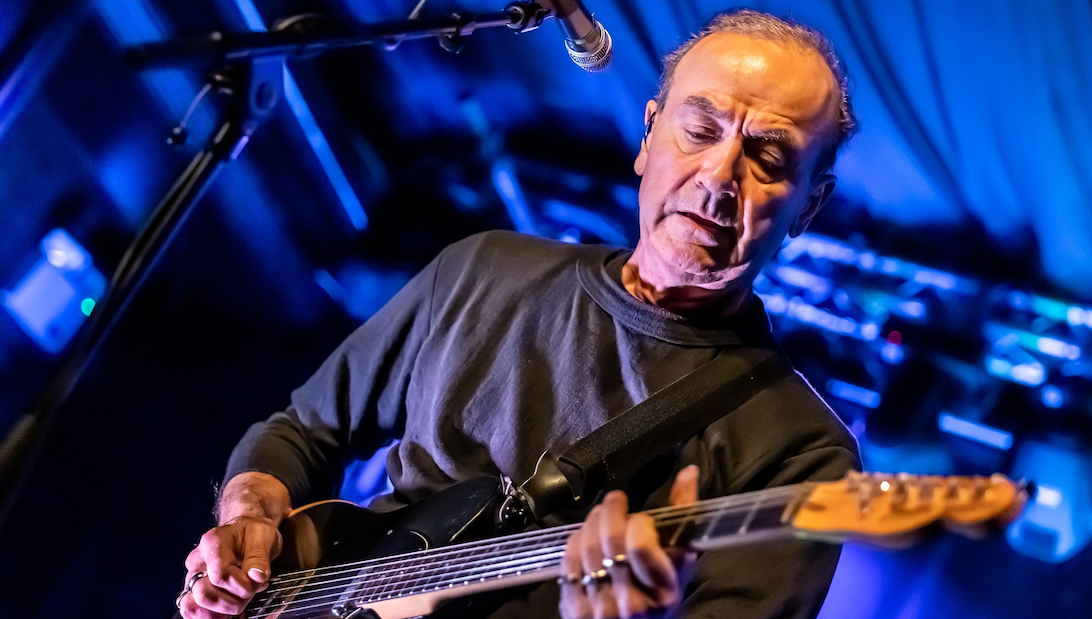
The method and madness of Hugh Cornwell
Hugh Cornwell is best known for the seventeen years and ten studio albums he made with UK band The Stranglers, but it’s his work as a solo artist both during that time and since leaving the band in 1990 that is far more interesting to him. With his most recent album, 2022’s Moments of Madness, being lauded as “a modern-day masterpiece” and “the most significant album of Hugh’s illustrious career,” he’s both bemused by the attention and excited to make more music. Before that, though, he has an Australian tour coming up—his first since 2018—which will bring him to Rosemount Hotel on Saturday, August 10. SHANE PINNEGAR caught up with Hugh Cornwell to find out why he’s enjoying making and performing music now as much as he ever has.
After introducing each other, Cornwell, Zooming from Mexico, doesn’t hesitate, launching into a hilarious anecdote about visiting Perth zoo on a Stranglers tour many years ago and finding that “everywhere we looked, all the animals were copulating!” As far as ice breakers go, this is a good one. But does he agree with the praise Moments of Madness has received?
Well, I mean, I’m just gobsmacked, you know—I just can’t believe that they’re saying this. Are you sure you have the right album? Or have you picked it up by mistake? You know, this is by me. You know you’re not allowed to say things like that about my records!
After almost fifty years of making music, you must be chuffed with the reviews?
Yeah, well, I must be going in the right direction—let’s put it like that. I mean, for every record I make, it would be nice to know that I’m progressing rather than regressing!
And it seems like the next one, which I’m planning at the moment, may be another step in the right direction. But I must say that when I used to make records a long, long, long time ago with The Stranglers, it was a very boring process because we all had defined roles in the band and therefore in the studio. So we’d rehearse: You had a studio booked for three weeks with this producer, and then he’s got to go off and produce The Eagles or somebody else, so therefore there’s only that limited amount of time you could spend in the studio.
So, you had to be prepared, which meant that there was no time for improvisation, mistakes, or anything like that, so it was a bit like painting by numbers. We’d go in, and everything was done dang, dang, dang—do the drums, then you do the bass, then you do the guitar—it was the most boring process.
It really was tedious, and now I love recording because I go in with basically unfinished songs. I go in with just an idea, and then I’ll shape it, model it, and polish it all in the studio with my engineer. You come out at the end of the day, and you think, ‘My God, I had no idea when we started today that that little thing that I had was going to turn into this!
It’s surprising to hear that while the album and its predecessor, Monster, sound like band efforts, it was you playing guitar and bass yourself—and you used a drum machine?
It’s quite easy with my band because there’s only bass, drums, and guitar, and I’m the lead vocalist and the lead guitarist. So, it’s only the drums and bass to be added, along with backing vocals. I don’t play drums, and there are hardly any keyboards on my records these days. I started off as a bass player, so on Moments of Madness it was possible for me to play bass, which I really enjoyed doing—and I’ve got the callouses to prove it, which lasted about six months.
And the drums, well, my recording engineer, Phil Andrews, who I’ve been working with for a very long time now, he’s very good at programming drums, so you know, between us, we can shape what the drums could be. So I go well; how about if it’s a bit like this? And I tap something out to him, and then he does something. I go no or yeah, a bit like that, and it ends up that people don’t know the difference—I mean, with Monster, everyone thought it was a drummer playing and it wasn’t. It’s remarkable. It’s an illusion, Shane. It’s all smoke and mirrors!
I believe you started working on this album in 2020 during lockdown, which is surprising to me. I’ve spoken to a lot of creative people who felt that the anxiety and uncertainty of the time actually overshadowed their ability to create, so they didn’t get much done.
Oh, well, that’s a surprise to me. For me, it was just the best way to use the time, you know? I never had any doubt that it was going to end at some stage. I don’t know why, but I didn’t even consider it. I thought, well, it’s going to last a certain amount of time, and then… maybe my biochemistry background, you know, knowing about viruses, bugs, diseases, and all that, which I studied a bit when I was at college, maybe because of that, I knew. And the flu epidemic of 1920. I mean, it took a while, but we came out of it, you know, and it was a similar sort of thing—it killed loads of people, but it got diluted and entered the status quo of our lives. So, I never doubted it—that anxiety didn’t grip me and didn’t inhibit me; I just had all this time to concentrate on making a record, and I really enjoyed it.
I really love the film clips, especially for Trash and Beware of the Dolls. Were they made by a Japanese animator?
Yeah. His name is Teru Noji. He lives in the south of France. He’s a genius. A little one-man genius—he’s remarkable. Does it all by himself. You know, he’s a one-man animation show. A very, very talented guy. I love that. You know, I mean, who wants to see another boring video of a band playing a song or someone singing a song? It’s much more interesting to find people who can visually interpret the song, you know, into something that is enjoyable and pleasing to watch.
And how do you feel about playing Stranglers songs alongside your solo work?
I can’t deny that I was in The Stranglers for 17 years, and I can’t deny that I made a big contribution to the writing style of that band. And so, it’s part of me, and to not play any songs from that era would be a bit primadonna-ish, I think. It just wouldn’t be me. And I’d feel very uncomfortable not playing any of those songs—they’re part of me. And I don’t play in the same way because I don’t have keyboards. I’m capable of playing these songs with new arrangements, and some of them are quite fun.
What we found over the last period of time while I’ve been a trio is that the older Stranglers songs are easier to adapt to a trio set up than the later ones, and the reason for that I’ve worked out is because when we started we were a trio, so those songs translate really, really well into a power trio, like Hanging Around and London Lady, Get A Grip On Yourself. They just fit seamlessly into the pocket of a three-piece, you know, so it doesn’t bother me to play a selection of The Stranglers’ catalogue. It’s fun.
I never really thought that The Stranglers sounded at all like other punk bands. How did you feel about being lumped in with that punk movement?
Well, nobody (in the band) was really bothered about it, because it was such a great opportunity, you know, for attention and audiences and to get a record contract. All the people around then wanted to find an audience, get recognition, and get a record contract so they could make records. The Jam and Elvis Costello in the UK, Blondie in America—they recognised the opportunity and grabbed it, and no one was complaining, you know.
You mentioned earlier that you’d studied biochemistry. Do you keep your hand in, in the whole biology side of things?
Well, the only way I do is that I look after my health and my body in the sense of diet and stuff like that. That’s all down to biochemistry, you know, exercise, and all that stuff. It’s all chemistry. It’s fascinating. My diet is full of little things that I know have great effects on my health, you know, and I’m lucky to know—to be aware of that. So no processed food, you know? Processed food is out the window as far as I go. If you can’t see where it’s come from, then I don’t eat it—like sausages, you know, very, very dubious thing sausages!” (laughs)
